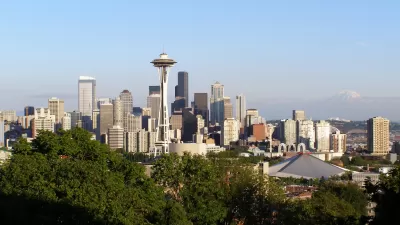Congestion

Seattle's Low-Cost, High-Efficiency Street Parking Program
For an effective, low-cost alternative to San Francisco’s bank-breaking street parking program, look no further than Seattle.
Is Traffic Congestion Good or Bad?
No one likes to be stuck in traffic. But while empty streets may look great from behind the wheel of a car, they could signal a city in distress. A new study identifies the tipping point at which congestion becomes a drag on a city's economy.
Opponents Question Plan to Replace Sydney CBD Parking With Cycle Lanes
Debates rages on in response to the City Centre Access Strategy as it's revealed that the CBD could loose around 20% of its parking places and loading zones on two key streets to make way for the expanded cycle path scheme.
Improving Mobility Requires a Multimodal Consideration of Congestion
As urban populations increase and drivers seek to escape crowded commutes, America's urban transit systems are becoming increasingly congested. For TDM professionals to improve mobility for all, they must first change how they conceive of congestion.
Expanding Bike Lanes a Focus of Sydney "Access Strategy"
New South Wales Government have published the "City Centre Access Strategy", their vision for transport planning in Sydney for the next two decades. Jacob Saulwick reviews the mixed responses to the long awaited plan.
Will HOT Lane Usage Decrease When Drivers Realize How Little Time They're Saving?
Perhaps it's not surprising to learn that HOT lane usage increases when prices increase. Higher prices, after all, signal congestion up ahead. What is surprising is the amount drivers are willing to pay to shave mere minutes off their commute.
Jakarta Confronts its Transit Transgression
You think your daily commute is bad? In one of the world's largest cities, a lack of citywide rapid transit means daily commutes of four hours for many Jakarta residents. Help is on the way, but conditions may get worse before they get better.
D.C.'s Gridlock Has Improved; What Can Be Done to Sustain Recent Gains?
Recent studies report a noted decrease in traffic congestion in the D.C. area. Robert McCartney credits two trends and asks how the area should spend additional transportation revenues that will be generated by recent tax increases.
Driverless Cars Are Coming, But They'll Bring Congestion and More Fuel Consumption
Although driverless vehicles are being touted for their potential to reduce congestion and fuel consumption, among other benefits, Casey B. Mulligan argues they'll actually induce the reverse.
Cars are the Cholesterol of Buenos Aires’ Veins
The problem of increasing congestion is plaguing the development of the city of Buenos Aires, not to mention the deleterious effects on residents' quality of life.
Santa Monica Battles Itself, and Consultants, Over Parking
In this supposed progressive paradise, the recent removal of a transportation consultant reveals the conflicting agendas of residents that want to reduce congestion and those who want to build more parking. Then there are those that want both.
D.C. Mustn't Look Far to Find Lessons for Reducing the Nation's Worst Congestion
Washington D.C. holds the dubious distinction as the nation's most congested city. As D.C. seeks ways to reduce its traffic, Arlington County, in suburban Virginia, has made great strides in convincing commuters to ditch their cars.
Can Intelligent Traffic Lights Ease Toronto's Gridlock?
Faced with paralyzing gridlock, North America's fourth-largest city is studying several potential solutions for easing congestion - including traffic lights that think for themselves.

Ending the Ceaseless Cycle of Car Dependency
Rather than the doomsday scenarios envisioned by critics, recent results indicate that closing streets to cars can have a demonstrable effect in improving circulation.
New Study: Light Rail Fails at Discouraging Driving
Eric Jaffe reports on research that may give pause to light rail advocates who argue the mode can reduce congestion: ridership gains along new lines may come at the expense of buses, rather than cars.
Better Traffic Flow Is a Two-Way Street
Cities such as Dallas, Denver, Sacramento and Tampa are reversing course on their one-way streets for a number of reasons; but improving traffic flow likely isn't one of them. Eric Jaffe looks at a recent study that upends conventional wisdom.
Planning for Movement Chokes Urban Health
In his latest entry in KCET's "Laws That Shaped LA" Series, Jeremy Rosenberg looks at the impact that the Functional Classification system has had on the urban form of Los Angeles and cities throughout the country since its adoption in 1973.
A High Line for the Upper East Side?
Matt Chaban reports on the making of “the Upper East Side’s very own High Line." Current proposals seek not only to "re-pedestrianize" Park Avenue, but also to restore some of its turn of the century glory.
Boston Subway in Danger of Becoming a Victim of Its Own Success
A new report from the Urban Land Institute concludes that Boston's subways could become overwhelmed by widespread congestion by the end of the decade without investment in more subway cars, better power and signal systems, reports Eric Moskowitz.
Pagination
Urban Design for Planners 1: Software Tools
This six-course series explores essential urban design concepts using open source software and equips planners with the tools they need to participate fully in the urban design process.
Planning for Universal Design
Learn the tools for implementing Universal Design in planning regulations.
Ada County Highway District
Clanton & Associates, Inc.
Jessamine County Fiscal Court
Institute for Housing and Urban Development Studies (IHS)
City of Grandview
Harvard GSD Executive Education
Toledo-Lucas County Plan Commissions
Salt Lake City
NYU Wagner Graduate School of Public Service


































